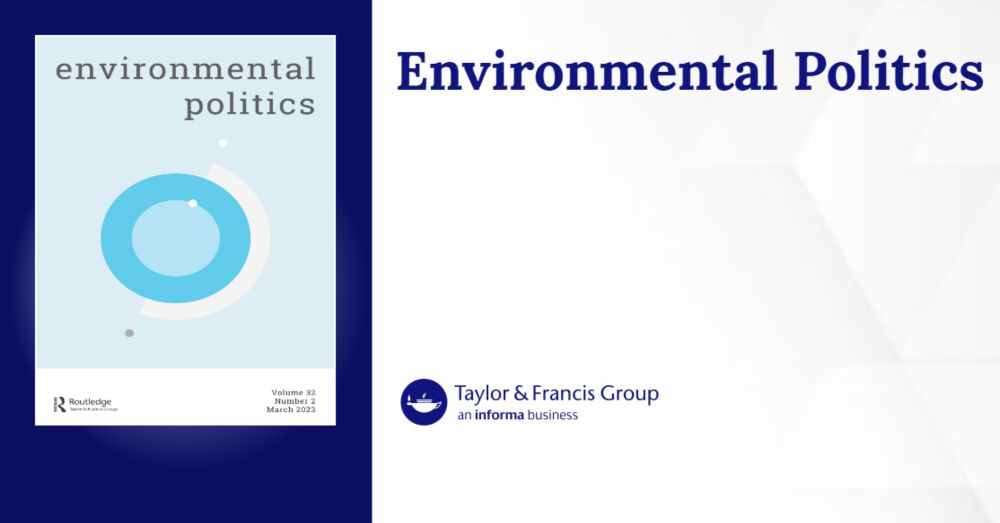How do Europeans want to fight climate change? Comparing and explaining public support for a wide variety of policies | Journal of Public Policy | Cambridge Core
How do Europeans want to fight climate change? Comparing and explaining public support for a wide variety of policies
We’re happy to share new research co-authored by one of our colleagues: How do Europeans want to fight climate change?
Comparing and explaining public support for a wide variety of policies. By @mfair.bsky.social and @joakimkulin.bsky.social, and Ingemar Johansson 🔗 doi.org/10.1017/S014...
07.10.2025 08:15 — 👍 2 🔁 1 💬 0 📌 1
People with more trust are more accepting of costly policies, and it seems political trust makes people more confident that costs will be compensated by benefits. Because most people are distrusting, however, costly policies are unpopular--even policies experts recommend, like taxes.
(4/n)
25.09.2025 18:36 — 👍 3 🔁 1 💬 1 📌 0
In this new paper, we present one of the largest ever studies of public support for different climate policies--16 policies, 6000+ respondents in four countries (DE ES PL SE), and a survey experiment that makes a big contribution to our understanding of why people prefer the policies they do.
(1/n)
25.09.2025 18:31 — 👍 2 🔁 1 💬 1 📌 1
In a new @jpublicpolicy.bsky.social study, with @mfair.bsky.social and Johansson Sevä, we show that support for a wide range of climate policies varies considerably, and that people with low political trust are the most sensitive to policy costs, thus helping to explain opposition to carbon taxes.
26.09.2025 06:37 — 👍 1 🔁 1 💬 0 📌 0

Logo of the Journal of Public Policy with the text "#OpenAccess" below in white on a black background.
#OpenAccess from @jpublicpolicy.bsky.social -
How do Europeans want to fight climate change? Comparing and explaining public support for a wide variety of policies - cup.org/3W89P1g
- @mfair.bsky.social, Ingemar Johansson Sevä & @joakimkulin.bsky.social
#FirstView
25.09.2025 07:45 — 👍 3 🔁 3 💬 1 📌 0

An interesting article by @mfair.bsky.social, Ingemar Johansson Sevä and @joakimkulin.bsky.social is now available on our FirstView page. It is entitled "How do Europeans want to fight climate change? Comparing and explaining public support for a wide variety of policies”.
Enjoy it here: t.ly/ZWy5u
25.09.2025 09:06 — 👍 5 🔁 3 💬 1 📌 0
Yeah, so this paper focused exclusively on whataboutism, but hopefully soon I will be able to provide an answer from a published study. :)
29.08.2025 10:39 — 👍 2 🔁 1 💬 1 📌 0
Glad you found it interesting!
29.08.2025 09:42 — 👍 3 🔁 1 💬 1 📌 0

Trump Bows to Putin’s Approach on Ukraine: No Cease-Fire, Deadlines or Sanctions
Nice hed, NYT. And this: "Even in the annals of Mr. Trump’s erratic presidency, the Anchorage meeting with Mr. Putin now stands out as a reversal of historic proportions." @peterbakernyt.bsky.social www.nytimes.com/2025/08/16/u...
16.08.2025 20:25 — 👍 368 🔁 118 💬 61 📌 12

It doesn't matter whether conservative ideals and policies are good or bad, popular or unpopular, if they are imposed on Americans unlawfully and arbitrarily. A free society is ruled by law.
Given Trump’s lawlessness, we no longer have a legitimate government.
trib.al/UdMH6uD
16.08.2025 21:47 — 👍 277 🔁 99 💬 16 📌 8
No, scientists (and research more broadly, incl. funding) focusing more on how bad it is getting (mainly physical sciences) rather than how we stop it (mainly social sciences).
15.08.2025 06:21 — 👍 0 🔁 0 💬 0 📌 0
We all know it will get (really) bad.
14.08.2025 21:50 — 👍 0 🔁 0 💬 0 📌 0
I guess I am not primarily thinking about ”social movements” (sorry for the particular wording) but rather scientists aiming to move reality. If that makes sense.
14.08.2025 21:44 — 👍 0 🔁 0 💬 1 📌 0

Former UK Prime Minister use his megaphone to promote climate delay through whataboutism (redirecting responsibility by blaming others for climate change). If you find this retorical strategy interesting, you might like this @environmentalpol.bsky.social study: www.tandfonline.com/doi/full/10....
01.05.2025 13:36 — 👍 5 🔁 2 💬 0 📌 0

BREAKING! Country that emits 1.4% of global GHG emissions would only contribute about 1.4% of global temperature stabilization efforts under Net Zero scenario! 🙄
19.04.2025 13:30 — 👍 56 🔁 7 💬 6 📌 4

Lomborg has made outstanding claims before, but this is one of (if not the) most rediculous one(s) so far. And this rhetorical strategy, blaming other nations to redirect responsibility (whataboutism), undermine climate action and is often driven by nationalism. www.tandfonline.com/doi/full/10....
19.04.2025 19:59 — 👍 8 🔁 2 💬 1 📌 0

Only 15 countries have met the latest Paris agreement deadline. Is any nation serious about tackling climate change?
The low submission rate undermines the global commitment to climate action.
”The latest deadline for countries to submit plans for slashing the greenhouse gas emissions fuelling climate change has passed. Only 15 countries met it – less than 8% of the 194 parties currently signed up…” theconversation.com/only-15-coun...
23.03.2025 11:06 — 👍 3 🔁 0 💬 0 📌 0
Haha ok.
21.03.2025 13:36 — 👍 1 🔁 0 💬 0 📌 0
Yes, I now agree that metric is inflated. However, I am not trying to make a purely scientific point but rather shift the perspective. Knowing some public opinion research on the topic, the target audience does not like/want carbon taxes (internalize the costs), and this needs to change.
21.03.2025 13:35 — 👍 0 🔁 0 💬 1 📌 0
I think we agree over the paper being somewhat misleading, at least as you say for laypeople. Some of that they were upfront with, both in the paper and news article. But phrasing these things in another way, like what I suggested, is possibly a way to get people thinking. Or not. Time will tell. :)
21.03.2025 12:53 — 👍 0 🔁 0 💬 1 📌 0
I agree on the vehicle externalities point, but disagree with the idea that unpaid externalities are not, in effect, subsidies. :)
21.03.2025 12:10 — 👍 0 🔁 0 💬 1 📌 0
This needs to be said: Unpaid externalities (e.g., no or low carbon taxes) are gifts from the public/governments to the fossil fuel industry. You may call them subsidies — without which the industry would not survive. In other words, we subsidise them, and the price is the public good. The end.
21.03.2025 12:03 — 👍 5 🔁 1 💬 0 📌 0

World oil and gas subsidies worth $7trillion - Energy Live News
Economic study says cutting fossil fuel 'hidden' subsidies would mean hitting climate goals now
Global CO₂ emissions would fall by 32%, with 40% of countries—including India, China and Russia—meeting their Paris Agreement targets simply by cutting fossil fuel subsidies, which in 2022 amounted to $7 trillion (7.1% of global GDP!). www.energylivenews.com/2025/03/18/w...
20.03.2025 07:10 — 👍 111 🔁 62 💬 5 📌 8

Amazon rainforest cut down to build highway for COP climate summit
The infrastructure required to host COP30 in Belém is undermining the cause, campaigners say.
There is irony, and then there is this: ”A new four-lane highway cutting through tens of thousands of acres of protected Amazon rainforest is being built for the COP30 climate summit in the Brazilian city of Belém.” www.bbc.com/news/article...
14.03.2025 21:29 — 👍 4 🔁 1 💬 0 📌 0
Advisor Green mobility at Copenhagen City
The Official Bluesky Account UU Sociology department
https://www.uu.se/en/department/sociology
Private capital reporter at the Financial Times
Contact me at alexandra.heal@ft.com
Previously FT visual storytelling | Previously previously environment and social affairs at The Bureau of Investigative Journalism
The Journal of Public Policy from Cambridge University Press
cambridge.org/pup
#polisky
The latest research in Political Science and International Relations from @universitypress.cambridge.org.
cambridge.org/politics
Academic, activist, lover of nature, football, drums & dogs
Stanford economist:
Professor of Political Economy; Business & Sustainability.
GSB, Doerr, NBER, CEPR, UiO, TSE, 3ERCs.
Homepage: https://www.gsb.stanford.edu/faculty-research/faculty/bard-harstad
Climate & environmental economics; international trade.
Official account of the European Association of Environmental and Resource Economists - EAERE
https://www.eaere.org/
#EAERE
Senior Policy Fellow at the Jacques Delors Centre at the Hertie School, Berlin | Think tanking on social cohesion & just transition in the EU
Advisor on EU climate action at the European Commission, and lawyer drafting, negotiating and working to implement strong and effective climate policies since 2000
Communications director at @Stand.earth. Environmental advocate. Climate communicator. Recovering journalist. Practicing hope as a discipline. Born in CIN, raised in CHI, home in AVL.
The professional journal of the European Consortium for Political Research (ECPR), publishing contributions written by and for the political science community.
Professor at ASU
#DevEcon #EnvironEcon #AgEcon #EnvironDemography #PoliticalEcon
Non-resident fellow at IFPRI
Member of AERE Org Board of Directors
Deputy Editor at Climatic Change
Livin’ it up in Spain 2025-6
Gold Open Access journal from the European Consortium for Political Research (ECPR) https://www.tandfonline.com/toc/prxx20/current
We're a news service that helps you understand climate change and what you can do about it. Get climate solutions in your inbox: yaleclimateconnections.org/sign-up-for-our-weekly-e-newsletter/
European Political Science Review (EPSR) is an #OpenAccess journal of the European Consortium for Political Research (ECPR).
Publishing original and substantial contributions to the study of comparative European politics. A journal from the European Consortium for Political Research (ECPR) https://ejpr.onlinelibrary.wiley.com/journal/14756765
Sociology Lens (formerly known as the Journal of Historical Sociology), published by WILEY
https://onlinelibrary.wiley.com/journal/2832580x
We work on planetary problems. Currently: counting climate change-related deaths; pandemic risk assessment in a changing biosphere; data, science, and vaccine access during public health emergencies. 👉 carlsonlab.bio
Since 1967, the Essex Summer School in Social Science Data Analysis has provided social science methods training for hundreds of participants each year. Offering over 40 Courses in 2025, online and in-person
Learn more at: https://essexsummerschool.com/














